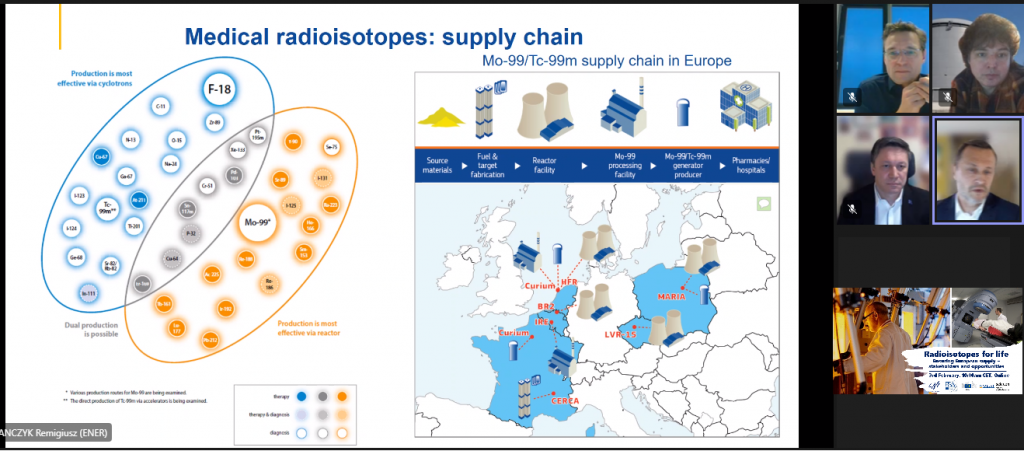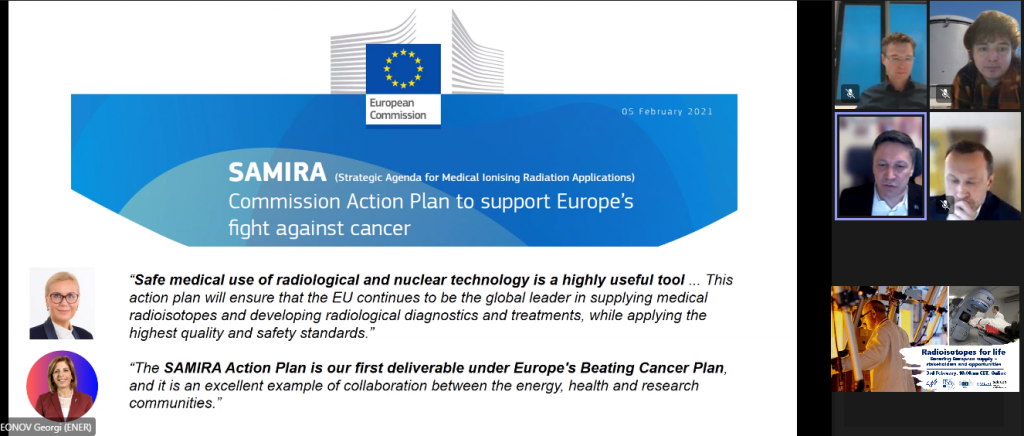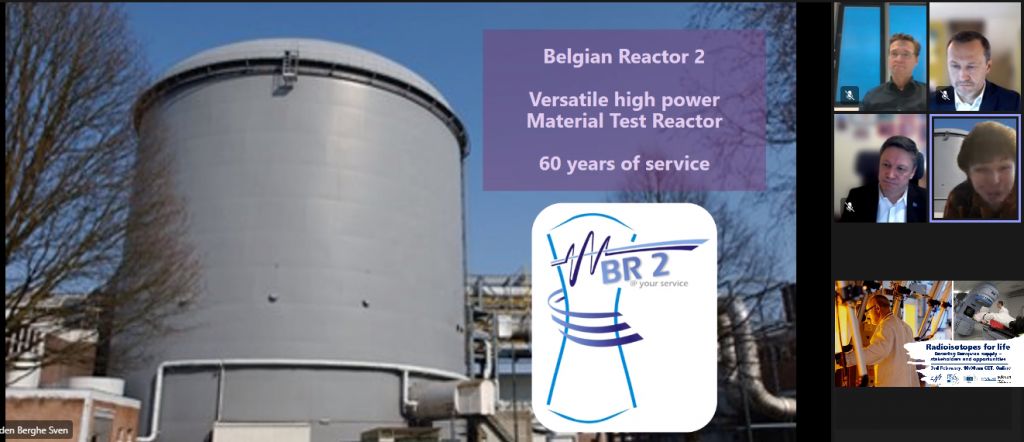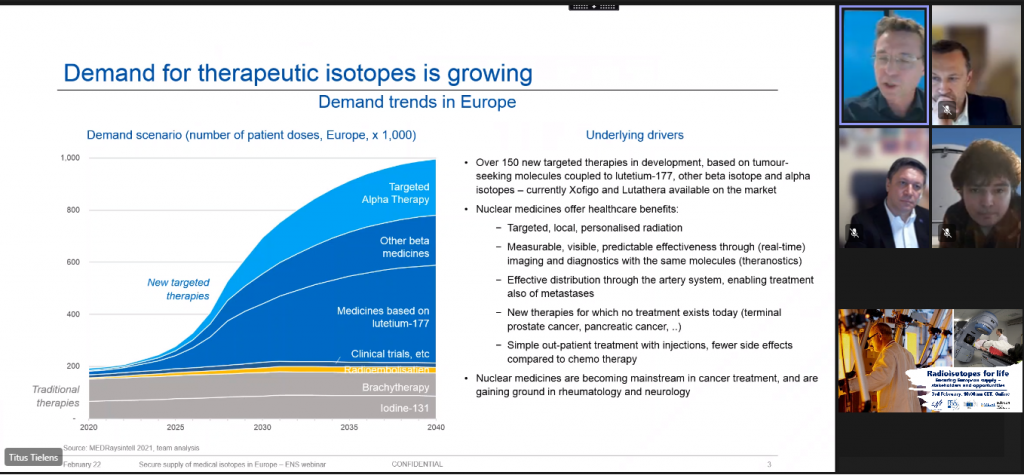Radioisotopes for Life // Ensuring European Supply – Stakeholders and Opportunities
The European Nuclear Society organised the webinar “Radioisotopes for life. Ensuring European supply – Stakeholders and opportunities”, in collaboration with Euratom Supply Agency, SCK CEN (both ENS Members), PALLAS and the EU Commission DG ENER.
Speakers, moderated by Kristoff Muylle (former President of the European Association of Nuclear Medicine – EANM), discussed several points related to the production and supply of radioisotopes in Europe.
Presentations ranged from the European Observatory on the Supply of Medical Radioisotopes to the SAMIRA Action Plan and the European Radioisotope Valley Initiative. The discussion then moved to the current activities of an operating research reactor producing these life-savings radioisotopes (BR2 – SCK CEN) and to the future project for a new facility (PALLAS reactor).
A thorough programme, which attracted more than 90 participants and livened up an inspiring Q&A session.
Following the profitable exchange of inspiring ideas and experiences, all the guests stressed again the crucial role those medical radioisotopes play in beating cancer and on the necessity to secure reliable, stable production and supply chain for the future.
Aiming at these key goals, common efforts should converge towards strong cooperation and a long-term Action plan at the European level. Moreover, more investments in new facilities and technologies are fundamental to ensure the future, continental supply, facing a demand increasing year by year.

Europe already plays an essential role in this sector. As highlighted by Remigiusz Baranczyk (ESA Head of Sector “Monitoring of Nuclear Market and Supply of Medical Radioisotopes”), 4 irradiation services suppliers on 6 are located in our continent, where more than 1500 nuclear medicine centres deliver about 10 million procedures to patients each year. These impressive figures make the EU the leading supplier of medical radioisotopes to the world market (more than 60% of market share for some radioisotopes).
So, the European Observatory on the Supply of Medical Radioisotopes (co-chaired by ESA and the industry association Nuclear Medicine Europe (NMEu) plays an important role in monitoring all the aspects related to this field.
Among its functions, the Observatory:
- supports secure and sustainable radioisotope supply across the EU,
- it ensures political visibility of the medical radioisotope supply issue,
- it identifies any event likely to impact the radioisotope supply, including logistics
- it publishes periodic reviews and reports of the radioisotope supply chain and capacities.
Georgi Simeonov (DG ENER’s Unit “Radiation Protection and Nuclear Safety”) underlined once again the centrality of Europe in the radioisotopes’ world production and market, presenting the SAMIRA (Strategic Agenda for Medical Ionising Radiation Applications) Action Plan.
the SAMIRA (Strategic Agenda for Medical Ionising Radiation Applications) Action Plan.
The Plan aims to improve EU coordination, ensure that radiological and nuclear technologies continue to benefit the health of EU citizens, and contribute to the fight against cancer and other diseases.
In this framework, one of the main actions of the SAMIRA AP is the launch of the European Radioisotope Valley Initiative (ERVI), to maintain Europe’s global leadership in the supply of medical radioisotopes and help accelerate the development and introduction of new radioisotopes and production methods.
Mr. Simeonov highlighted also some issues that could affect the production and supply of radioisotopes in the near future. As analysed in several studies and reports, the current European research reactors fleet is not sufficient to meet the future increasing demand for radiopharmaceuticals. Moreover, EU full dependence on foreign HALEU supply could become critical in the future.
The four different scenarios forecast with NucAdvisor stress one common point: the need for more investments and projects to secure the supply chain.
Looking in detail at how radioisotopes are produced in a research reactor, Sven Van den Berghe (SCK CEN Institute Director, Nuclear Materials Science Institute) presented the structure and the activities ongoing at the BR2, operating since 1961 in Mol, Belgium.
 This research reactor produces 15 different kinds of radioisotopes, that are used for several applications, including diagnosis, palliative treatment and therapy. The optimisation of the irradiation conditions and available positions in the core is possible thanks to the BR2 flexibility in core configuration.
This research reactor produces 15 different kinds of radioisotopes, that are used for several applications, including diagnosis, palliative treatment and therapy. The optimisation of the irradiation conditions and available positions in the core is possible thanks to the BR2 flexibility in core configuration.
From the point of view of an operator, the constant increase of operation costs may affect the radioisotopes supply chain. Furthermore, reactors’ ageing issues could impact the production as well. Mr. Van den Berghe also highlighted the importance of social returns on investments, which need to be sustainably balanced and significantly increased to maintain the support of the host countries.
So, in order to avoid the precarity of the future European supply chain, new irradiation centres are required, at least 2 large and 2 small installations able to secure the supply for all medical radioisotopes. The current situation is considered to be critical, but functional if there are no disruptions.
The recent reschedule of work at MARIA research reactor to respond to the temporary shortages of medical molybdenum-99 is a clear example. The positive, strong collaboration between radioisotopes producers is the key to overcoming unexpected events or shortages in a sector that requires continuity.
Finally, Titus Tielens (PALLAS Strategy Director) focused on the crucial role of medical isotopes in beating cancer and other diseases, and on the future perspective for the European supply chain.
Gathering the conclusions of his colleagues, Mr. Tielens highlighted once again the challenging increase of the demand, which is expected to skyrocket in the next decades because of more and innovative therapies. In order to meet it, new facilities like the PALLAS reactor, laboratories and health centres are fundamental.
It is clear that no single countries can be the solution, but common efforts at European level is necessary.
concluded Mr. Tielens.
In a very active Q&A session, also transport has been underlined as a very important parameter in the radioisotopes supply chain, taking into account all the related issues.
ENS is keen to continue the discussion and to offer a new event on this interesting topic in the coming months.




